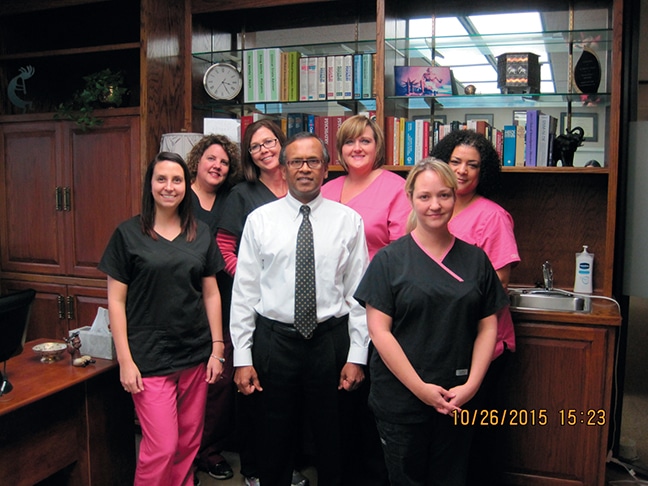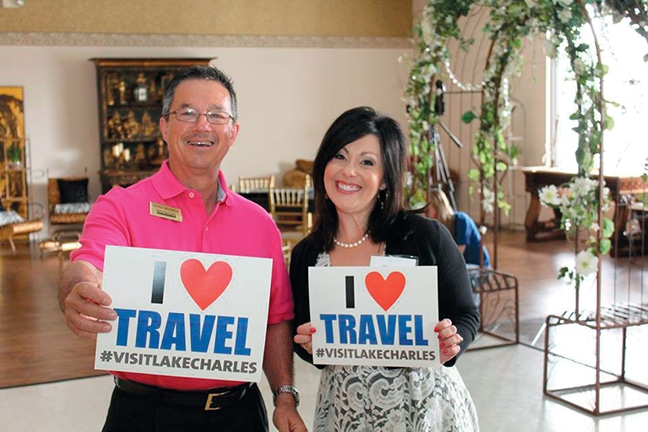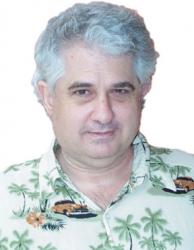Lake Charles Clinical Trials Provides Comfort And Hope To Those With Alzheimer’s
By Brad Goins

From left: Jordan Bertrand, Kandyce Peveto, Dr. Allyson Bennett, Dr. Kashinath Yadalam, Colleen Smith, Sharon Garrett and Kami Mallett.
Lake Charles Clinical Trials is all about finding new drugs to combat hard-to-treat or incurable diseases. The Clinical Trials operation was started in 2000 by Lake Charles newcomer Dr. Kashinath Yadalam. Yadalam runs L.C. Clinical Trials as he continues his ongoing work at both the Institute for Neuropsychiatry and the Adult Services department of Memorial Hospital in Lake Charles.
Yadalam and his staff of 14 run 15 different clinical trials at any one time at the Clinical Trials office in the Capitol One building. The office tends to do trials for such conditions as depression, bipolar disorder, schizophrenia and Alzheimer’s.
Clients are never charged or billed for any work done at the office. L.C. Clinical Trials has no billing office.
Those who feel they may be showing signs of Alzheimer’s can come into the office and get an assessment free of charge. Patients can make an appointment, but they can also walk in at any time. Those who walk in are guaranteed to receive an assessment within an hour.
Each Alzheimer’s patient who participates in a trial is assigned a coordinator caregiver by the office. Both participants and caregivers receive payment for their participation. Pay ranges from $100 to $200 per visit for both patient and caregiver. Payment varies according to the nature of the trial.
Transportation is provided or the cost of transportation is covered.
The office is available to clients 24/7 year-round; calls are returned within the hour.
Clients can choose to withdraw from a clinical trial at any time.
The medications currently available at pharmacies help perhaps one in four patients. By “help” it is meant that the drugs will halt the progression of the disease.
More than 10 compounds are being tested at L.C. Clinical Trials right now; four of these are for Alzheimer’s.
“It is critical we find a cure since more people are being diagnosed due to increased longevity of the general population,” says Yadalam. “At this juncture, the only way we know to find a cure, save for serendipity, is by conducting clinical trials with new compounds. Increased trial participation increases the chances of finding new compounds.”
Finding Energy For The Brain
The clinical trial we’ll focus on in this story — NOURISH AD Phase 3 — involves a drug for those with mild to moderate Alzheimer’s disease. For the trial to be completed, the number of clients participating must increase by 25 percent.
“NOURISH AD will test if AC-1204 improves memory and thinking in people with Alzheimer’s disease,” says Yadalam.
Research studies have shown that the brains of people with Alzheimer’s often have difficulty using glucose. Glucose, a simple form of sugar, is the brain’s primary source of energy.
The human body makes ketone bodies — an energy source the brain can use instead of glucose. The NOURISH AD study will determine whether the increasing of ketone body levels in the brain will improve test scores that measure memory and other mental skills in those with Alzheimer’s.
The experimental drug that is being used to increase the ketone body levels is called AC-1204. It is administered to clients over a 26-week period. Clients take the drug each day. Results from clients who take the drug are compared with those who are taking a placebo.
The study will also determine whether administration of AC-1204 has a positive effect on daily activities, use of resources and quality of life in subjects with mild to moderate Alzheimer’s.
The Increasing Need
“We don’t make any promises” that a trial will benefit a patient, says Yadalam. What he can promise is that L.C. Clinical Trials will “offer good state-of-the-art care” to its clients.
Alzheimer’s “is a problem that’s only going to increase as people live longer,” says Yadalam.
At present, those who reach the age of 85 in the U.S. have a 50/50 chance of developing Alzheimer’s. Yadalam says the age at which Americans reach that 50/50 risk ratio is dropping; the reasons for the drop in age aren’t yet known.
“It’s important that we find something that will alleviate the suffering and morbidity of the disease,” he says.
‘Our Lives Drastically Changed’
Lake Charles Clinical Trials has come to play an important part in the life of well-known local photographer Victor Monsour, who was recently diagnosed as suffering from early onset Alzheimer’s.
“For a couple of years, we knew there was a problem,” says Monsour’s wife Tamara. The couple spent many months going to many consultants and physicians, ruling out conditions.
Finally, they visited a neurologist who told them not only that Victor had early onset Alzheimer’s, but also that he had gone beyond the first stage of the condition.
The local doctor recommended participation in clinical trials and referred the couple to a memory specialist in Houston. There was a nine-month wait. After the examination finally took place, the doctor informed the couple that Victor’s condition had reached the stage at which he should no longer drive a vehicle.
“Our lives drastically changed that day,” says Tamara. “[Alzheimer’s patients] become totally dependent on you. You’re their everything.”
The Houston doctor recommended against a clinical trial conducted in Houston because, he said, the amount of time the couple would have to spend driving back and forth to Houston would be “a burden.”
Tamara started doing what she’d wind up doing a lot of — research. She ran across the site clinicaltrials.gov.
She discovered a clinical trial for an Alzheimer’s medication that was taking place right at home in Lake Charles — at Lake Charles Clinical Trials.
As Yadalam got the details of her husband’s assessment and clinical trial worked out, Tamara began to learn more about the role of the caregiver in the clinical trial process. She learned, for instance, that even if Victor could still drive, as his caregiver, she’d still have to be with him when he went to his sessions at L.C. Clinical Trials.
Each time Victor goes to see Yadalam, he’s tested to see whether his condition has improved, worsened or stayed the same. Part of the evaluation process is an interview with Victor’s caregiver — Tamara. She needs to tell the doctor what Victor had been doing and saying during the time that’s passed since the last assessment.
Each session lasts from 1 1/2 to 4 hours. But Tamara says the sessions aren’t an imposition. The “staff members are wonderful, helpful, kind. You don’t mind going.”
Of course, Tamara’s role as caregiver extends far beyond her task of accompanying Victor to L.C. Clinical Trials. She’s learned there are “many challenges” to being the full-time caregiver of an individual with early onset Alzheimer’s.
“The primary challenge is ensuring their safety,” says Tamara. “They just don’t remember the rules.”
When she talks of “the rules,” she means the standard procedures involved with what many of us consider simple, everyday tasks, such as operating a stove or microwave or taking a walk or viewing an exhibit. Victor remembers that he used a microwave in the past. But he no longer remembers “the rules” about what is safe and unsafe for a microwave.
“They’re used to doing what they want to do,” says Tamara. “but they don’t have their bearings.”
One reason Victor is frustrated when he’s not allowed to use objects with which he is familiar is that he remains very physically healthy.
One caregiving technique Tamara employs to reduce Victor’s degree of frustration is to call Victor’s disease by a name; in this case, “Big Al.” When Victor becomes angry because he is forbidden to use the microwave or take a walk by himself, Tamara may say, “I’m not going to argue with Big Al.” This statement is designed to remind Victor that his angry behavior is not being caused by Tamara’s prohibitions but by Victor’s disease — “Big Al.”
The Most Challenging Role
The job of caregiver is every bit as difficult as it sounds. “This role is something you have to learn,” says Tamara. “It’s the most challenging role I’ve ever had.”
She approaches the acquisition of this new role just as she approached the process of learning about her husband’s condition — by doing research, research and more research. She recommends that those in similar conditions read books and consult with other people in the same situation and with doctors and psychologists.
She says “a lot” of the people who become caregivers are like her: “they always want to control everything. It’s so hard [for them] to ask for help.”
“Friends and family members do want to help,” says Tamara. One way in which they can help easily and directly is to give the caregiver a break. “It’s so helpful to get a caregiver away for a few hours,” says Tamara.
Being Part Of A Cure
When Victor Monsour began taking the experimental drug under the auspices of L.C. Clinical Trials, he didn’t stop taking any of his regular Alzheimer’s medications.
Even if the experimental medication improves Victor’s condition, he won’t be able to keep taking it once the trial period ends. The general public can’t take any medication until it’s approved by the FDA. Even if test results for this particular experimental drug are positive, the FDA approval process will probably take at least a couple of years.
So why go through the trials? People participate because they hope to make the future better for people who get their disease.
“If he can help being part of a cure, he wants to do that,” says Tamara. The trial process gives Victor “some hope that a cure or a therapy to slow the disease down” will be found.
Victor’s case is an example of the awesome force with which Alzheimer’s can strike a victim down. He had none of the signs that indicate a high chance of Alzheimer’s. He didn’t work in a high-stress job. He was far too young to be in the age group of those who most often contract the disease. He had no family history of the disease; he was not genetically disposed to it. And he was a male. (Women get Alzheimer’s more often than men do.)
Age, gender, genetics, occupation — all these were in Victor’s favor. But he contracted Alzheimer’s nevertheless.
What can concerned citizens do about a fatal disease that can strike in such an arbitrary manner? They can make every effort to support research into a cure or treatment for Alzheimer’s.
For info about enrolling in the current study at Lake Charles Clinical Trials, visit AD-trial.com or call 337-564-6405.

















Comments are closed.